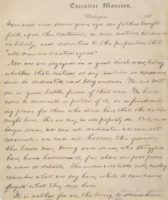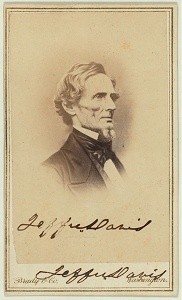
One of the only photo’s in existence of Lincoln at Gettysburg before delivering his address
I don’t know what the name Gettysburg conjures up in your mind, if anything, but in my mind I get an overwhelming sense of sadness at the loss suffered by the Confederacy; for Gettysburg, along with the fall of Vicksburg probably turned the tide, which had been decidedly in favor of the Confederate Army, and eventually led to Lee’s surrender at Appomattox.
But it is not the town of Gettysburg, nor the battle which saw over 50,000 men die that I wish to talk about; it is the speech given by Abraham Lincoln after the battle that I wish to discuss. I can’t speak for most of the younger generations, whose history teachers have eliminated, or distorted much of our nation’s history, but anyone over 40 probably could tell you where the words, ‘Four score and seven years ago…‘ come from; Lincoln’s Gettysburg Address.
History books tell us that Lincoln scribbled of the words to this famous speech while on a train heading to the site of the wars deadliest battle; yet that is not the case. The copies still in existence show that the surface upon which he wrote was firm, and not subject to bounces and vibration as would be the case had he written them while aboard a train. It’s also interesting to note that, of the five remaining copies in Lincoln’s handwriting, there are slight variations of the text. But all this is just filler material; it is the text of Lincoln’s address that I would like to discuss.
I once read somewhere that the best way to tell a lie is to cloak it in partial truths. I think Lincoln did that quite effectively in his Gettysburg Address. Lincoln begins by saying, “Four score and seven years ago our fathers brought forth on this continent, a new nation, conceived in Liberty, and dedicated to the proposition that all men are created equal.”
For those of you who don’t know what a score is, aside from the total points scored by football teams that is, it represents 20 years. So what Lincoln was actually saying was, 87 years ago our fathers brought forth…which is essentially true. However, when Lincoln says that they brought forth a nation, he is being somewhat misleading.
When our country first gained its independence it was not a nation; not as we know it today anyway. A nation, back then, was considered to be a single entity under one system of government. However, America, at the end of the Revolutionary War was a confederacy of individual nations. There was the nation of Massachusetts, the nation of Virginia, etc; each with their own system of government; fully autonomous and independent from each other. If we were a nation in 1863, when the Battle of Gettysburg was fought, we didn’t become one until the constitution was ratified in 1789; not in 1776 as Lincoln claims.
Lincoln, as much as I despise the man, was a masterful speechwriter, and he cloaked his lies in truth very well. He then completes the lie sandwich, as I have taken to calling it, between another truth; ‘…conceived in Liberty, and dedicated to the proposition that all men are created equal.’ Those words are almost directly taken from the Declaration of Independence, a document he was trampling upon with his war against the South; but I’ll get to that in more detail in a moment.
 Lincoln then states something that is also a bit misleading, or if not that, then at least a bold change of position from comments he made at the onset of this bloody war. Lincoln next states, “Now we are engaged in a great civil war, testing whether that nation, or any nation so conceived and so dedicated, can long endure.”
Lincoln then states something that is also a bit misleading, or if not that, then at least a bold change of position from comments he made at the onset of this bloody war. Lincoln next states, “Now we are engaged in a great civil war, testing whether that nation, or any nation so conceived and so dedicated, can long endure.”
First of all, this was not a civil war as Lincoln claims. Civil wars are typically wars in which one segment of a country rise up and try and overthrow the existing government; replacing it with a government of their own choosing. That is not what happened in 1861! The South seceded from the Union, they DID NOT attempt to overthrow the government of the North, nor did they seek any conquest; they only wanted to be left alone; free to govern themselves in the best manner they saw fit.
But it is the next few words that lead me to believe that Lincoln was slowly changing his position on why this conflict was being fought. Originally he claimed that the war was being fought to preserve the Union; not to end slavery. I have provided ample evidence in previous articles to back that up, so I won’t waste your time by providing quotes you have already read.
So what did Lincoln mean when he said, “…testing whether that nation, or any nation so conceived and so dedicated, can long endure.” Was he talking about the Liberty this country was conceived upon? If he was, why was he trampling upon the liberty of the States who chose to leave the Union? Or, was he subliminally inferring that since slavery still existed in America that all men were NOT considered equal? If he was implying that, then it would be a drastic change of position from his earlier statements on why the war was being fought.
Lincoln’s next words are probably basically true, “We are met on a great battle-field of that war. We have come to dedicate a portion of that field, as a final resting place for those who here gave their lives that that nation might live. It is altogether fitting and proper that we should do this.”
Lincoln then goes on to say that the men who fought at Gettysburg have already consecrated the ground with their sacrifice. He then goes on to say something which history has proven wrong, “The world will little note, nor long remember what we say here, but it can never forget what they did here.”
How many of you can name more than one or two of the commanding generals who faced off against each other at the Battle of Gettysburg? How many can name of few of the key sites which were bravely fought over or defended during that battle? You see, unless you have taken the time to study what happened during those 3 days of fighting, you won’t know any of that; which proves that history HAS forgotten what those men did there. But I’ll bet that your history books at least mention Lincoln’s Gettysburg Address.
Continuing, Lincoln then says, “It is for us the living, rather, to be dedicated here to the unfinished work which they who fought here have thus far so nobly advanced.” Well he must have been speaking about those left alive on the Union side of the battle, for he certainly couldn’t have been speaking about advancing the cause for which the brave Confederate soldiers fought and died. I wonder if he even gave a damn about those who died for the Confederacy?
Lincoln’s final words sound more like a locker room pep talk than they do the dedication to a memorial site for those who had died during the battle, “It is rather for us to be here dedicated to the great task remaining before us — that from these honored dead we take increased devotion to that cause for which they gave the last full measure of devotion — that we here highly resolve that these dead shall not have died in vain — that this nation, under God, shall have a new birth of freedom — and that government of the people, by the people, for the people, shall not perish from the earth.”
It is the last words, after the double hyphen that I would like to focus the remainder of my discussion on, “… that this nation, under God, shall have a new birth of freedom — and that government of the people, by the people, for the people, shall not perish from the earth.”
Again Lincoln uses the word nation; which I have already discussed. Lincoln’s war pretty much obliterated most of what our Founders believed to be the rights of the States, or the people, up to that point in history. Our Declaration of Independence states that “…whenever any Form of Government becomes destructive of these ends, it is the Right of the People to alter or to abolish it, and to institute new Government, laying its foundation on such principles and organizing its powers in such form, as to them shall seem most likely to effect their Safety and Happiness.” Did Lincoln allow the South to do that? Of course not, he raised an army and said, “Rejoin the Union or else!” (My words)
He then said that this ‘nation‘ shall have a new birth of freedom. To what was he referring? Was it to the eventual emancipation of the slaves; which was a complete turnaround for him, or was it for his idea of freedom for all the people of his ‘nation’? How can he claim to care about freedom when his war was using military force to compel the South to do something against their will? Is that his definition of freedom? Could Lincoln have actually meant freedom from free will and self governance, replacing it with the freedom to live under a system of government that uses force to coerce the people into obedience?
However, it is Lincoln’s final comments which irritate me the most, “…that government of the people, by the people, for the people, shall not perish from the earth.” I know most of you don’t know the difference between a federal system of government and a national one, but our system was designed primarily to be a federal government; meaning that the States retained their sovereignty and all powers not specifically delegated to the central government by the constitution.
Lincoln’s words make no mention of State sovereignty or authority, and along with his use of the word nation again, imply that he didn’t give a rat’s ass about State sovereignty; that all he cared about was nationalizing the country under one system of government. In fact, the words ‘… government of the people, by the people, for the people…‘ can almost define what is meant by a national form of government, as there is no mention of the States in any capacity.
The South did not rebel against the government instituted by our Founders in 1789; they revoked their agreement to be a part of a union in which the government established by our Founders had overstepped its just authority and was making a tyrannical use of its powers to their detriment. Had the government remained true to what the constitution said there would have been no need for secession, and there would have been no Civil War.
You may not be aware, but the Confederate States of America wrote their own constitution after they seceded from the Union. You may also not know that it was basically the same thing as the constitution which established our government in 1789, with a few minor changes that is. They felt that the constitution itself outlined a good system of government, but that it was lacking in sufficient guards against the usurpation of power by the government it outlines. So they modified their constitution to prevent such abuses of power.
 Maybe now the quote from Confederate President Jefferson Davis will make a bit more sense to you, “I love the Union and the Constitution, but I would rather leave the Union with the Constitution than remain in the Union without it.” What he was saying in a roundabout way was that the government of the Union no longer adhered to the limits the constitution imposed upon it, and that he would rather leave the union than remain in it, subjugated and oppressed by its government.
Maybe now the quote from Confederate President Jefferson Davis will make a bit more sense to you, “I love the Union and the Constitution, but I would rather leave the Union with the Constitution than remain in the Union without it.” What he was saying in a roundabout way was that the government of the Union no longer adhered to the limits the constitution imposed upon it, and that he would rather leave the union than remain in it, subjugated and oppressed by its government.
The problem, as I see it, is that you cannot have a rational discussion with people these days regarding the Civil War without most people’s minds zeroing in on the subject of slavery. Slavery has been pounded into their heads as the sole cause of the Civil War, and any attempt to get past that with the truth is doomed to fail.
If a person is blind and cannot see the sky, does that change the fact that the sky is blue? Well it’s the same way with the truth; simply because people cannot see it, or won’t open their eyes to it, doesn’t change the fact that the truth remains the truth.
It is your choice as to what you ultimately decide to believe about the Civil War; you can choose to believe the lies you have been taught, or you can seek out the truth. It is out there, just waiting for people to find, and embrace it. All you have to do is get off your ass and go looking for it.
February 12, 2018
 ~ The Author ~
~ The Author ~
Neal Ross, Student of history, politics, patriot and staunch supporter of the 2nd Amendment. Send all comments to: bonsai@syix.com.
If you liked Neal’s latest column, maybe you’ll like his latest booklet: The Civil War: (The Truth You Have Not Been Told) AND don’t forget to pick up your copy of ROSS: Unmasked – An Angry American Speaks Out – and stay tuned – Neal has a new, greatly expanded book coming soon dealing with the harsh truths about the so-called American Civil War of 1861-1865. Life continues to expand for this prolific writer and guardian of TRUE American history.

Thank You for this article
The Civil War, birth of the National Democracy. Great article.